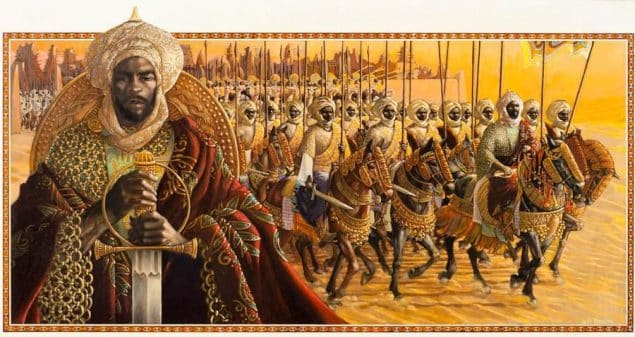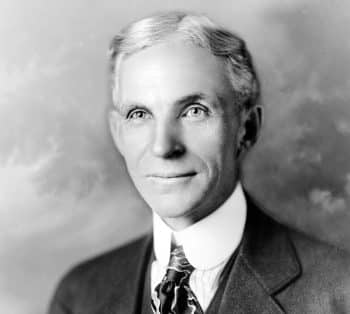Home » Spotlight » Who Are The Richest People Ever to Have Lived?
Who Are The Richest People Ever to Have Lived?
https://www.whatjobs.com/news/what-news-topical/who-are-the-richest-people-ever-to-have-lived

By Hugh Fort in Spotlight, posted March 17, 2024

When we think of the richest people in the world, the usual names such as Jeff Bezos, Elon Musk, and Bill Gates come to mind.
To ordinary people, these billionaires seem astronomically, impossibly wealthy.
We gawp at incredible stats about how it's not worth them picking up a $5 bill if they drop it because they earn more in the time it takes to hit the ground and find that unfathomable.
It's hard to believe, therefore, that there have been people in history who have been far, far wealthier.
Here are some of the richest people ever to have lived.
Mansa Musa
It's very hard to prove who the wealthiest person of all time was, but it could be Mansa Musa.
He was the ninth Mansa of the Mali Empire, which was essentially the king and ruled in the 14th century.
At its peak, his kingdom contained the countries we need to know today as Niger, Senegal, Mali, Burkina Faso, Guinea, and the Ivory Coast.
He was able to mine the abundant natural resources of these countries - particularly gold and salt - to create astonishing wealth.
At one stage he had so much gold it crashed the market.
He was known for his incredible generosity, handing out enormous amounts of gold and building a new mosque every Friday.
Genghis Khan
From a man known for his great generosity to a man known for incredible violence and as one of the greatest military leaders in history.
Khan was the master of the Mongol empire in the 1200s, which remains the biggest in history.
Pinpointing how rich he was is impossible, but you can be assured that a man in charge of such a vast area of land, having conquered many territories and their assets and controlling their trade routes, is very wealthy indeed.
John D. Rockefeller
Fast forward 600 years, and you get to John D.Rockeller.
He was an American industrialist and philanthropist who founded the Standard Oil Company.
Through a combination of shrewd business tactics and aggressive expansion, Rockefeller built Standard Oil into a monopoly that controlled 90 percent of the U.S. oil refining industry.
He employed several controversial tactics, including price-fixing, bribery, and strong-arm tactics against competitors, which earned him a reputation as a ruthless businessman.
In 1911, the U.S. Supreme Court ruled Standard Oil violated antitrust laws and ordered the company to be divided into smaller, independent companies.
Rockefeller retired from the oil industry soon after but continued participating in philanthropy and public service.
For such a ruthless businessman, he was quite the philanthropist who donated large sums of money to medical research and education and helped establish the University of Chicago.
He died in 1937.
Rockefeller was estimated to have a personal net worth of over $1 billion, an enormous sum of money for that era.
Andrew Carnegie
Andrew Carnegie was a Scotsman who left home for the U.S. in 1848, aged 12.
He made shrewd investments in railroads, bridges, and oil derricks in the 1860s.
His big success was Pittsburgh's Carnegie Steel Company.
In 1901 he sold the company to J.P Morgan for a colossal $303 million.
This, in today's money, is nearly $10.5 billion.
Having acquired this enormous amount of money, he set about spending it all.
He built Carnegie Hall in New York, hundreds of libraries, and plowed money into scientific research.
For such a philanthropist, Carnegie was not seen as a nice man.
He was said to have a charming habit of asserting his perceived superiority as he handed dimes to homeless people.
The conditions in his workplaces also left a lot to be desired, even for that period.
Nonetheless, he managed to give away his vast fortune before his death in 1919.
READ MORE: $100 trillion notes and 'space money' – The weirdest coins and currencies
Jakob Fugger
Jakob Fugger had the nickname "Jakob the Rich," which tells you a lot about how his life turned out.
He was a German merchant, mining entrepreneur, and banker who became exceptionally wealthy in the 15th and 16th centuries.
He was so rich his personal fortune was thought to be around two percent of the total GDP of Europe when he died in 1525.
Fugger also invested heavily in Spanish exploration and the colonization of the Americas.
His massive wealth allowed him to establish numerous charities and churches.
He also played a crucial role in establishing social housing and education and is seen as a pioneer of the modern welfare state we see today.
Need Career Advice? Get employment skills advice at all levels of your career
Emperor Shenzong of Song
Emperor Shenzong of Song, also known as Zhao Xu, was the sixth emperor of the Song Dynasty in China, ruling from 1067 until his death in 1085.
He is considered one of the greatest emperors of the Song Dynasty, having implemented significant reforms that helped strengthen the central government and improve the lives of his subjects.
It is unclear how wealthy he was, but he would have had access to taxes collected, tributes from neighboring states, and huge natural resources.
He introduced a series of political and economic reforms aimed at consolidating his power and improving the lives of his subjects.
The tax system was also reformed, reducing the tax burden on the peasants and increasing taxes on the wealthy.
He also implemented policies to reduce corruption and improve the efficiency of the government bureaucracy.
Follow us on X, LinkedIn, and Facebook










